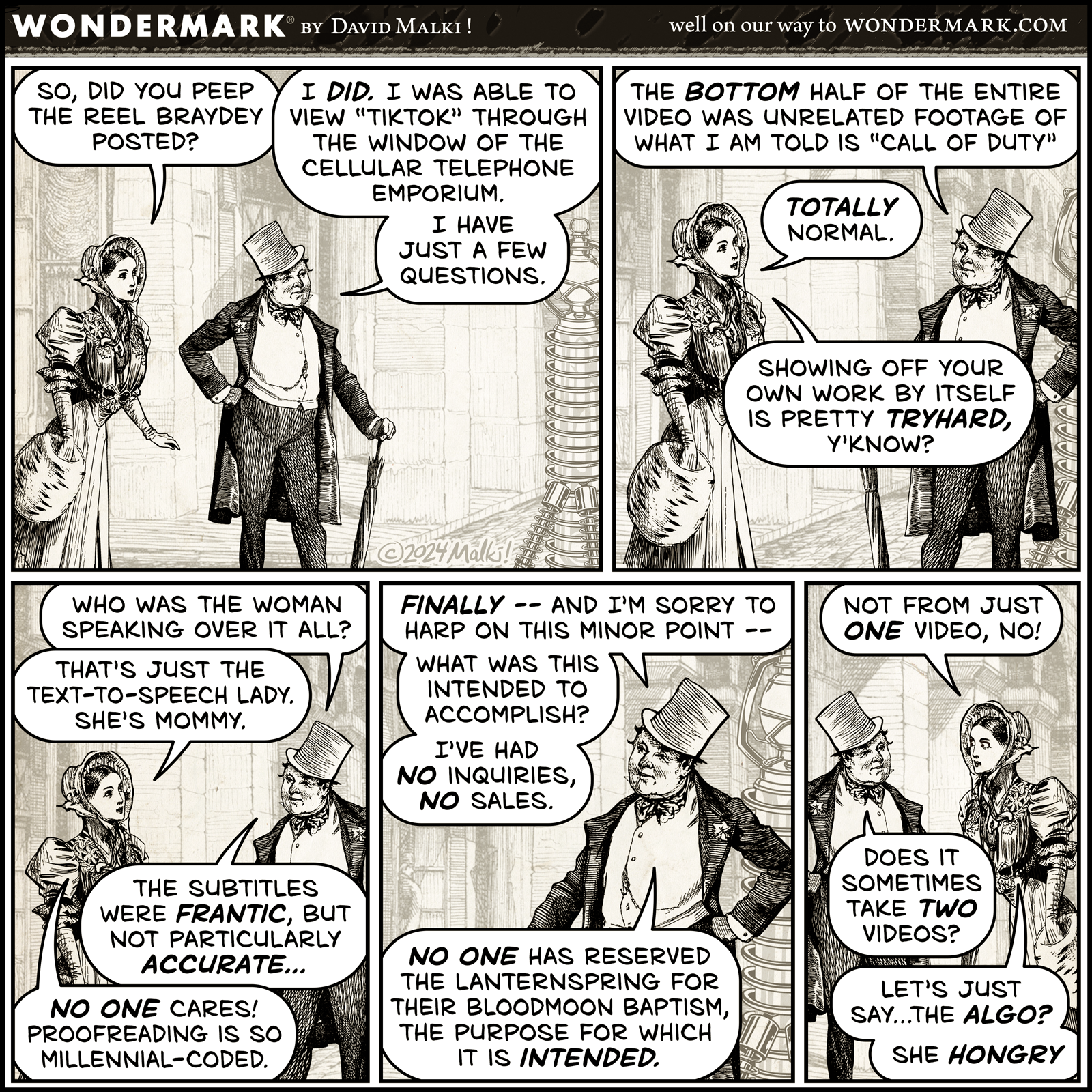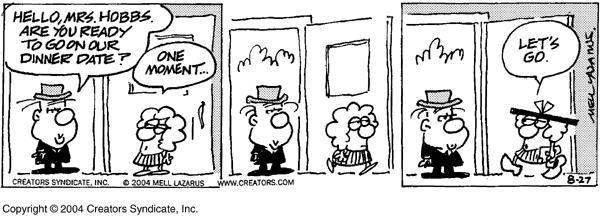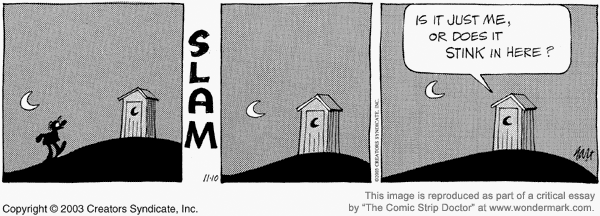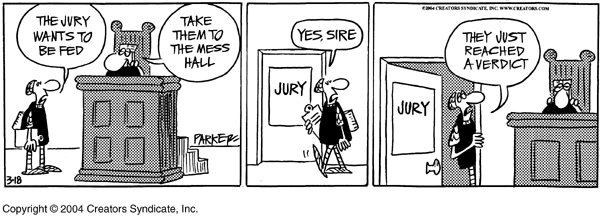
(Click any of the images to zoom in on them.)
Dr. Hibbert: Welcome to Mensa! You join such luminaries as cartoonist Mell Lazarus, Geena Davis, and Parade Magazine’s Marilyn vos Savant.
Prof. Frink: Each the tops in his or her field. Err, except for Mell Lazarus.
— “The Simpsons”
Following in the quirky Dik Browne-Bil Keane-Jimmm Davis tradition of alternative name spelling, Reuben Award winner Mell Lazarus is one of comicstripdom’s more prolific creators. From 1957 to 2002, he wrote and drew the daily strip Miss Peach, and Momma has been around since 1970.
Longtime readers of Momma, which relates the dysfunctional relationship between shrewish septogenarian Sonja Hobbs and her three good-for-nothing children, may be surprised to learn that Momma is the villain of her strip. She’s always been the nagging harpy, of course, but since her name is in the title I always figured that she was supposed to be the hero and her worthless spawn were the villains. Not so, says Lazarus; Momma is purposefully overbearing; she’s supposed to be the personification of everyone’s nagging mother. Lazarus adds that he initially launched the strip “out of boredom… and [in homage to] my mother, who was driving me happily crazy, bless her soul.”
In an article about his comic strip Edge City, which features a Jewish family, artist Terry LaBan says of Momma that “[Momma is] an example of a character that everyone knew was Jewish, although it has never been mentioned.” Lazarus’ view on the subject is evident in the following exchange:
Q: Since Momma appears to be the quintessential Jewish mother, do you ever get criticized for propagating the stereotype?
Lazarus: Oddly enough, no. I’ve heard that she suggests the stereotype, but I’ve never been criticized for it. A lot of readers have suggested she represent the universal mother figure. [italics added]
Accused of being “ageist, sexist and anti-Semitic”, Lazarus laughs: “That’s a remarkable thing to accuse me of since I am an aging Jew who loves women.”
One perhaps wouldn’t mind if Lazarus were a bit ageist, sexist, or anti-Semitic, since a little edge might make his strips funny, or at least pitiable. As it stands, Momma is bland — that’s not a crime, of course, but it’s also occasionally incomprehensible, which is when it leaps off the comics page and into the realm of my jurisdiction. Let’s take a closer look at the above comic.
In Momma‘s defense, the selected strip is a departure from the norm. Typically, Momma is berating her worthless offspring, dreaming of their ruin or spurning their ridiculous attempts at filial affection. Today, she’s got a gentleman caller, and her children are nowhere to be seen. Is Sonja preparing to move on with her life and rediscover the romantic spark of her youth?
Panel 1: A well-dressed man (or perhaps a potato salesman) stands at Momma’s front door, two strands of hair peeking from beneath the hat he has discourteously allowed to remain on his head. He has the portly small stature common to adults in Momma’s world, but otherwise there is nothing in the way of physical attributes to distinguish him from an infant. “Hello, Mrs. Hobbs,” he says. “Are you ready to go on our dinner date?”
Even before Momma replies, we can infer something about their relationship. This man is taking her on a date, but sees fit to remind her of that fact, as if he didn’t dare count on her remembering who he is and why he’s there. Perhaps he’s reminding her about their date as a way of confirming that the date exists, that they’d made plans, that it was something she had agreed to. “Our” dinner date probably refers to a mutually agreed-upon appointment; either that or he’s using the plural possessive pronoun on purpose to endow the date with a sense of mutuality it may not actually have.
Say, for instance, that it’s taken a fair amount of wheedling for this man (we’ll call him “Nermy” for lack of a name) to get Momma to agree to the date. By calling it “our dinner date” it implies that it’s an event that will be shared between them; compare this to saying “Are you ready for me to take you out tonight?”
Notice, however, the lack of genialities. “Hello, Mrs. Hobbs,” Nermy says. No “how are you,” no “you look lovely,” and certainly no flowers or other token gifts. This doesn’t mesh with the profile of a man who’s been trying for a while to get Momma out of the house — so perhaps that’s not the case at all.
What if Momma and Nermy were set up? It’s certainly reasonable that Momma’s good-fer-nuthin kids would try and hook their midget mother up with a homeboy in order to lighten her spirits and deflect her attention from their own shortcomings. But who would do such a thing? Certainly not lazy Francis, and probably not the gawky Marylou, whose only interaction with the male of the species is inebriated and with her holes all filled. No, the likely culprit is Thomas, the happily-married-closeted-gay whose wife has never met Momma’s muster. “You see,” Thomas is saying, “it’s not that easy to find a soul mate. I’ve done just fine. Now if only she had a penis.”
Hands drooping at his side, harelip curling in disgust, straw-hair posing a poking hazard, Nermy slouches at the front door and dutifully engages the enemy. In this light, “our dinner date” is a deflection of responsibility: we’re in this mess together. Similarly dispossessed, Momma slouches right back. “One moment,” she says, with the squinty glare she uses to advertise Francis’ shortcomings to the world.
Panel 2: Nermy, either mentally retarded or stoned out of his gourd, slowly sways on Momma’s front porch, not noticing that she’s walking away from him. His hair starts to wilt, and what may be clouds of marijuana smoke drift above his head. Momma, her jaw set, is determined to see the night through, and Thomas will have a tongue-lashing later. Probably not the kind he’d like, either.
Panel 3: Momma’s back, wearing her trademark two-by-four hat, clutching a handbag and stumbling in a set of clogs six sizes too big. She looks for all the world like a girl playing dress-up, if the girl were an angry wrinkled dwarf with no torso. Nermy’s expression seems to have changed, though from what to what I couldn’t tell you. “Let’s go,” Momma says, and looks as if she’s going to linebacker right through Nermy if he doesn’t move his doughy ass out of the way.
And that’s the end of the strip, Lazarus’ signature adorning the east wall with a flourish, his pride seeping through the lazily-applied halftone. Where’s the joke? What’s the punch line? What the hell is this?
There may be some humor in the determination with which Momma takes to the date, her eyes glazed with smoldering fury, as if angry that her sad life has turned to this low pursuit — dinner with a fattie! But the more likely explanation is that the strip is a wry comment on females and their preoccupation with preparation.
See, Momma’s wearing her typical watermelon dress when she opens the door. She’s not ready to go out just yet. But when Nermy arrives, all that it takes for her to get ready is her hat, handbag and shoes. There’s no hour-long makeup session; there’s no perm or curlers; there’s no bikini wax. Old people are sensible, says Lazarus; they’re simple, down-to-earth and serious.
But how do we know that Nermy hasn’t been standing there for an hour while Momma whittled those clogs from scrap lumber? He doesn’t seem like the assertive type that’ll call her on it; he barely seems like he’s seen the evening past the carefully rehearsed speech in Panel 1. Panel 3 could be Six Hours Later for all we know. Look at the shading on the wall: it could be daytime in Panel 2, and night in Panel 3. (And, logically, before sunrise in Panel 1.) The strip might be a commentary on how slowly old people do everything.
Again, if this is the intended joke, it hinges dangerously on the public’s understanding of the preconception about women and the time they take getting ready for a date. Wasn’t that prime Donna Reed Show material? Nowadays, getting ready for a date means putting in your diaphragm.
Here’s the original again:
So, if I’m going to fix this to retain what I presume is the original punch line, I’ll do it thusly:
Panel 1:
Nermy: “Hello, Mrs. Hobbs. Are you ready to go on our dinner date?”
Momma: “Just about. One second.”
Panel 2: Momma walks away.
Nermy: “Take your…”
Panel 3: Momma’s back already!
Nermy: “…time.”
Momma: “Outta my way. We’re late for the buffet.”
As I look over the strip again, another possibility creeps into my head: is it possible that Nermy’s shocked expression in Panel 3 is a reaction to the silly shoes that staid, homely Sonja Hobbs is wearing? I’d attributed the clunky clogs to Lazarus’ inability to draw dress shoes on a dwarf, but it’s possible that she’s wearing something so outlandish that it’s meant to be the punch line. Look at her! She actually wants to go outside in those things! On a date, no less!
Historically it’s been unwise to attribute a joke to what is more likely poor draftsmanship, but I’ll make it work:
Panel 1:
Nermy: “Hello, Mrs. Hobbs. Are you ready to go on our dinner date?”
Momma: “One moment…”
Panel 2: Momma walks away.
Panel 3: Momma’s back, wearing clogs.
Nermy: “Are we going clogging?”
Momma: “Any cracks about my hat and they’re going right up your ass.”
I think it’s best, in this case, to make a clean break from whatever the addled Lazarus may have initially conceived and make this funny at all costs.
Panel 1:
Nermy: “Hello, Mrs. Hobbs. I’m here from the colon therapy clinic.”
Momma: “Let me just get my things.”
Panel 2: Momma stalks off.
Panel 3: Momma’s back.
Nermy: “We can do the flush here if you prefer –”
Momma: “This is the closest I get to a date anymore, so don’t get fresh.”
Until next time… I’ll see you in the funny papers.
— August, 2004









